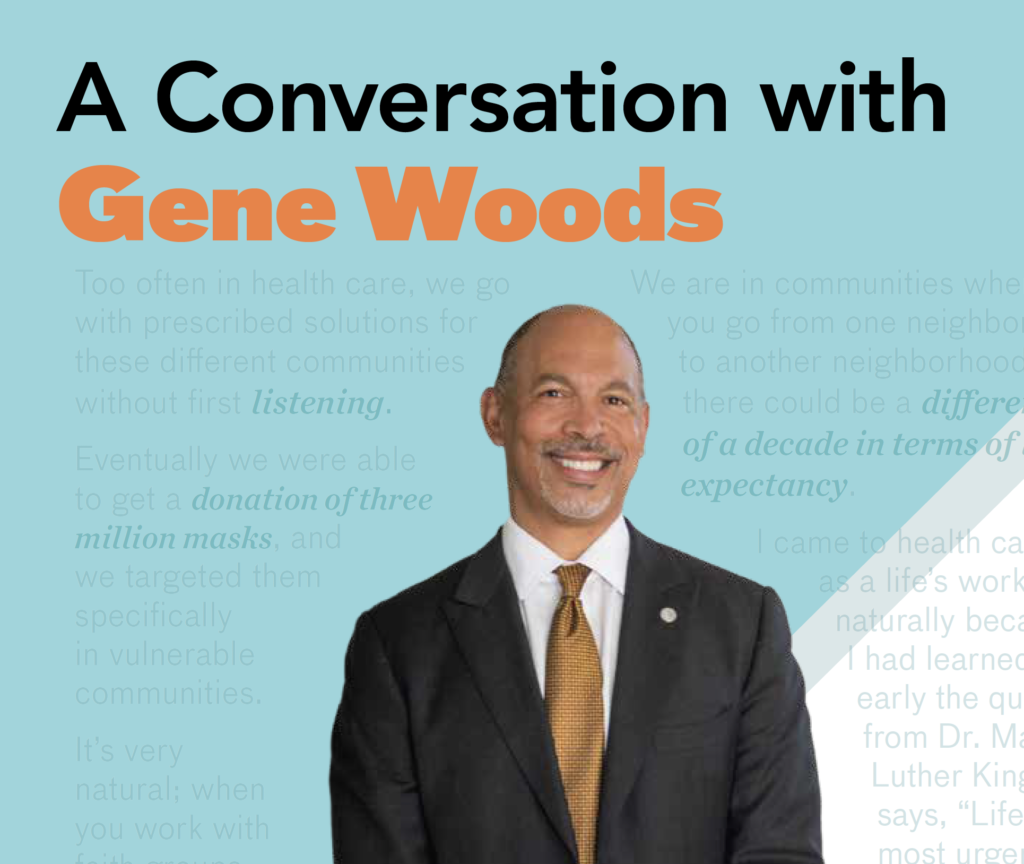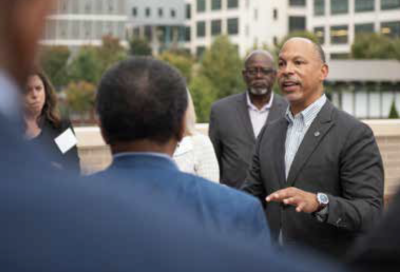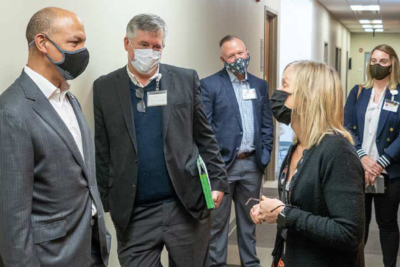
Eugene A. Woods, MBA, MHA, FACHE, is president and chief executive officer of Atrium Health, the academic health care system stretching from Winston-Salem to Macon, Georgia. This system now includes Atrium Health Wake Forest Baptist, the home of the FaithHealth Division led by Gary Gunderson and Jeremy Mosley. The two of them had the opportunity to talk with Woods about his faith and his vision for FaithHealth in this new combination.
So, how did you become you?
Woods: My father grew up in rural Tennessee as a Baptist, and my mother grew up Catholic in southern Spain. I don’t think my grandfather in Spain would have let it happen otherwise, so I grew up in the Catholic faith, including being an altar boy—my mother’s way of subtly trying to steer me to be a priest someday. This was formative in my upbringing and partly why I was so comfortable in two Catholic health care systems, Common Spirit and then Christus Health, just before I came here to Atrium. The key question from my earliest upbringing was always, “What are you doing for community? What are you doing to help those who are least among us?” Those values are deep in Atrium, too.
In Catholic systems, you start every meeting with prayer; here (at Atrium Health) we pause for “connect to purpose,” which gives space to talk about how we engage with each other? How do we take care of each other and our community? What attracted me to Atrium Health was that embedded in our core was this idea of caring for all, serving and providing health, hope and healing to all. So, in many ways, I feel like I’ve not left a ministry by being in this organization.
I came to health care as a life’s work naturally because I had learned early the quote from Dr. Martin Luther King that says, “Life’s most urgent and persistent question is, ‘What are you doing for others?’” In actuality, I signed up for the wrong career day. Instead of international business, I ended up meeting a hospital administrator and realized quickly that I could commit my life’s work this way.
Health care was not an abstraction for me. My aunt died of a medication error in a hospital. So, I saw the worst things that can happen when the system fails. She was just a wonderful lady who left three small kids. Even more personally, I was in a car that went head-on into a brick wall probably going about 70 miles an hour. I blacked out, but as soon as I came to there were these angels around me. There were people there to take care of us, to rescue us. I owe my life to people who ran toward the burning car while others ran away. I wanted to be like that.
How has your faith shaped your commitment to structural injustice?
 Woods: Most religions have a version of the golden rule: do for others as you’d have them do unto you. I think that’s at the core, it’s the service above self that connects me. I remember my mother inviting friends of other religions and having great conversations about their commonality that focused on helping the whole community. We may come from different places but find common work as we try to deal with some of the persistent social determinants of health or structural injustices to really meet the community where they’re at. This is not abstract. In COVID, we met with a group of 60 congregations in Charlotte called Village Heartbeat. We needed their help to deal with the inequities of the testing disparities and vaccine-linked problems. We know that they’re closest to the community. It’s very natural; when you work with faith groups, the shared faith leads you to that kind of shared work.
Woods: Most religions have a version of the golden rule: do for others as you’d have them do unto you. I think that’s at the core, it’s the service above self that connects me. I remember my mother inviting friends of other religions and having great conversations about their commonality that focused on helping the whole community. We may come from different places but find common work as we try to deal with some of the persistent social determinants of health or structural injustices to really meet the community where they’re at. This is not abstract. In COVID, we met with a group of 60 congregations in Charlotte called Village Heartbeat. We needed their help to deal with the inequities of the testing disparities and vaccine-linked problems. We know that they’re closest to the community. It’s very natural; when you work with faith groups, the shared faith leads you to that kind of shared work.
Too often in health care, we go with prescribed solutions for these different communities without first listening. And it feels like these communities are being “done to” rather than participating in the solution. So, we listen. I don’t just send people; I go, too. Last October, we went to a Y in a neighborhood that we knew had been really traumatized. Part of what we heard from the community is that they were in a pandemic way before this particular pandemic. COVID acerbated, but did not start, the problems of food insecurity, transportation, access to health care right there.
We are in communities where if you go from one neighborhood to another neighborhood, there could be a difference of a decade in terms of life expectancy. These are real deep issues to solve. If we were just to come and say that we’ve looked at all the data, this is what you need to do. We blind ourselves. We can move very fast, but we have to begin by listening. We’re having listening sessions right now as a matter of fact, on a potential clinic we’re going to put in a vulnerable area of town where there’s not access to food. There’s a high rate of uninsured. So fundamentally, if you don’t start with that, you start coming up with non-sustained solutions. We want to be in this for the long haul.
I’m proud this organization has a governance-based committee focused on nothing but social impact. Because structural injustices require structural solutions, and so we’re orienting ourselves on how we train leaders and things of that nature to truly understand these challenges so we can solve them for all.
Can leadership turn the whole team to this kind of learning?
Woods: When I first got here, I walked the halls for about three months just to understand what people’s aspirations were. There’s no substitute for eyeball to eyeball. But I also took a bus ride in all the most challenging neighborhoods. Some community leaders rode with me that had lived here for many, many years and never been in those communities. Things look different from a bus! So, there’s something powerful in really being there and seeing what the challenges are. We just have to do that ground-level work so you can really understand what’s real.
Once we see reality, we can be more appropriate about how to deploy some of our amazing capabilities, talent and, of course, a lot of technology. For example, during COVID, we had this “Hospital at Home” concept, and we were taking care of people at home because our beds were
full. Thirty percent of those with our Hospital at Home program were Latinx. The technology let us reach vulnerable communities that might not otherwise have access. But we have to understand the community and the technology at the same time.
Partnerships can move fast with enough trust.
Woods: I’m proud of the partnerships we built in the middle of COVID, with the faith community, as I just shared, or with the business community. Early on in the pandemic, when Gov. (Roy) Cooper was about to mandate masks, he asked if I would join him on the podium. I called my other CEO friends from Honeywell, from Bank of America, from Lowe’s—and remember, it was at a time when masks were hard to get—and within 48 hours, we had a million masks. Eventually we were able to get a donation of three million masks, and we targeted them specifically in vulnerable communities.
We did the same thing with mass vaccinations. We partnered with Honeywell, the Carolina Panthers, the Charlotte Motor Speedway and Bank of America. So, the bonds we built with these businesses, the faith community, and local, county and state government helped us learn a lot from each other. That will help us deal with other tough issues of injustices, disparities and social determinants of health. Those bonds we’ve built will continue to serve going forward because no one organization can solve these issues by themselves. We can’t do it as just a health care organization, we can’t do that just as elected officials. Can’t do that just as businesses. We have to work together.
You were telling us about showing up on the bus rides before there was a crisis. Then when you show up in the crisis, they were saying, “Gene’s bus came here.”
Woods: The really important part is trust. Part of what we’ve worked together on doing is building that sense of trust that we’re here. We’ll talk to you when things aren’t that bad, and then when things get challenging, you know that we’re going to still be right here with you all the way through. We’re not going to leave when the pandemic ends. Trust can’t be all the same everywhere. We’re not the same culturally, and we’re looking at how to continue to evolve our culture together, but at its fundamental core, it’s this commitment to community that is galvanizing for folks.
As we pull together our partnerships, we’re really going to lift up all communities from the shared knowledge, shared experience and shared commitment. This is one of the organizations in the country that’s really poised for significant social impact in a way that it’s not about talking about it. It’s about really doing and doing it in a sustainable way.
When we planned this interview months ago, we looked at the vaccine question and thought, “Oh, that’s probably not going to be relevant this fall.” But it turns out unfortunately it’s going to be relevant for months to come.
Woods: I’ve always thought we would face challenges with adoption of vaccines because we had issues with flu vaccine before, too. Thank God that we do have the vaccine right now. I shudder to think about where we would be, not just as a country, but as a global community if we didn’t have a vaccine.
 Now we just need to really listen to folks who have fears about it and continue to try to share with them that the science is good and strong and that they should get it, if nothing else, if they’re not worried about themselves, then to protect others, to protect their loved ones, to protect strangers. Because you never know who you would run into as an unvaccinated person whose grandmothers might be affected, for instance. So extraordinarily grateful, like all of us, that we had a vaccine, and now it’s just about working together through the issues to make sure everybody gets one and stays safe.
Now we just need to really listen to folks who have fears about it and continue to try to share with them that the science is good and strong and that they should get it, if nothing else, if they’re not worried about themselves, then to protect others, to protect their loved ones, to protect strangers. Because you never know who you would run into as an unvaccinated person whose grandmothers might be affected, for instance. So extraordinarily grateful, like all of us, that we had a vaccine, and now it’s just about working together through the issues to make sure everybody gets one and stays safe.
What would you want to tell your faith partners right now in this tough Southern land?
Woods: First and foremost, continue to pray for everyone in the system and the frontline workers. I have my mother on some type of rosary prayer circle because I think that is important now. And we have a way ahead of us to work our way out of this pandemic and all the issues that have come out of it. So, I would say first and foremost, your prayers are welcomed for all the 70,000 teammates and for those in the community also that are dealing with very challenging circumstances.
If we all do that in our own way, whether you grew up in a rural part of North Carolina or whether you grew up in a city somewhere and no matter what you look like, where you came from, if we have that orientation of listening, of first understanding, of humble inquiry if you will, I’m bullish that we can get stronger coming out of these days. And that’s where I keep focused on this idea of “for all.” Health, hope and healing for all. That gets me up in the morning, this idea of health—for all.
This is not about just waiting for people to be sick so we can take care of them when they come to our hospitals or our physician offices. When somebody brings their child to one of our children’s hospitals, they want to know that we’re going to cure them or take care of them or treat them well. But they also want, in every interaction, there to be hope or healing. And the healing aspect is not just physical healing, not just emotional healing, but spiritual healing as well. It means that when people come to us, they come to us as whole people. Health, hope and healing for all is our North Star.
